The Adomas Mickevičius Vilnius District Public Library located at Trakų street no. 10, Vilnius, is hosting a commemoration to mark the 80th anniversary of the beginning of the Holocaust in Lithuania at 6:00 P.M. on Thursday, October 28. Lithuanian Jewish Community chairwoman Faina Kukliansky; her daughter Ruth Reches, PhD, principal of the Sholem Aleichem ORT Gymnasium in Vilnius; Righteous Gentile and Jewish rescuer researcher Danutė Selčinskaja and director of the Andrena publishing house Nijolė Petrošienė will speak about the Jewish experience in Lithuania and discuss the books “Samuelis Kuklianskis: Attorney” and “The Experience of Identity by Holocaust Survivors” by Ruth Reches. The Lithuanian film “Gyvybės ir kančių duobė” [Pit of Life and Suffering] will be shown (duration: 60 minutes). The event will be filmed and photographed.
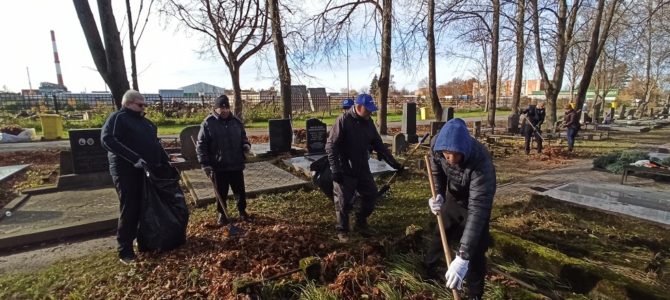
Volunteer Clean-Up at Šiauliai Jewish Cemetery
The Šiauliai Jewish Community organized a volunteer clean-up at the Donelaitis cemetery in Šiauliai. Everyone did a great job and many graves were put in good order. Well done!
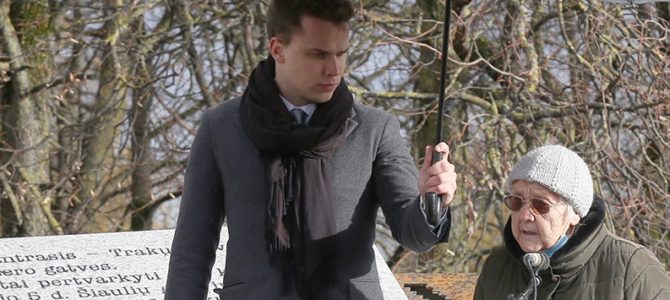
Šiauliai Unveils New Square of Righteous Gentiles
Photo: Righteous Gentile Genovaitė Černiauskaitė-Dugnienė expresses gratitude in name of Righteous Gentiles.
Righteous Gentile Square at the intersection of Vilniaus and Ežero sttreets at the former ghetto gates in the Lithuanian city of Šiauliai was opened ceremoniously and consecrated last week. The renamed square will showcase the names of people from the city and district of Šiauliai who rescued Jews during the Holocaust. The city of Šiauliai thus becomes the first municipality in Lithuania to honor Righteous Gentiles with a monument. The new park is the fruit of the Jungtis [Connection] project by Šiauliai-resident designer Adas Toleikis and includes artistic allusions to the former ghetto.
“You can’t buy love or tolerance for money, you have to grow it in your heart,” Righteous Gentile Genovaitė Černiauskaitė-Dugnienė said.
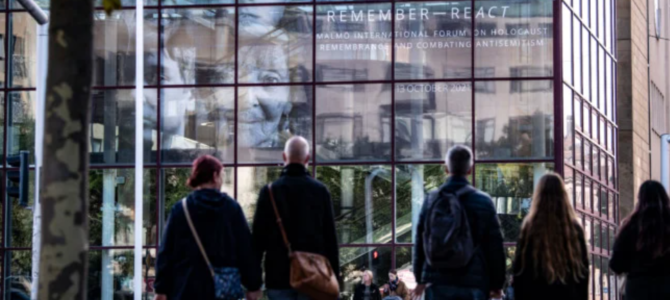
Lithuanian Pledges Made at Malmö Forum
Statement by Lithuania at the Malmö International Forum on Holocaust Remembrance and Combating Anti-Semitism
Malmö International Forum on Holocaust Remembrance and Combating Anti-Semitism
October, 12-13, 2021
Pledges by Lithuania for 2021-2025
The Lithuanian government is engaged in a number of initiatives on Holocaust remembrance and education, which are to be implemented within a 5-year perspective. The most significant of them include opening new museum spaces and updating existing school curricula incorporating modern teaching recommendations on the Holocaust. This is an important contribution to raising awareness and educating society not only about the Holocaust but also the ages rich history of Jews in Lithuania. It was extensively presented during the year 2020, which was officially dedicated to the Vilna Gaon and saw a significant increase of interest in Jewish life, history and heritage in Lithuania.
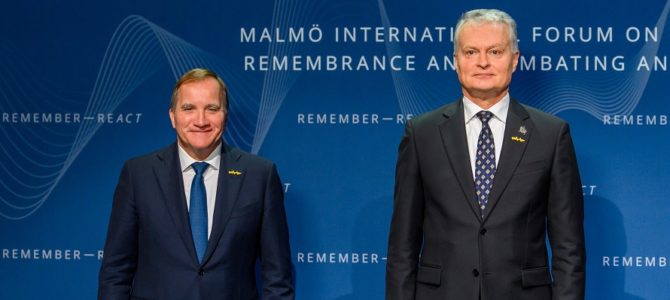
Lithuanian President Says Country Ready to Implement EU Strategy for Fighting Anti-Semitism
Lithuanian president Gitanas Nausėda at the Malmö International Forum on Holocaust Remembrance and Battling Anti-Semitism Thursday called for educating young people and resisting hate-speech and attempts to falsify history.
He said the great tragedy of the Jews of Lithuania touched almost every city and town and left a void. He said while it’s not possible to fill that void, it is necessary to insure the lessons of the Holocaust are not forgotten.
“We have to make sure the future generations remember and think about what happened. There is no other way to guarantee the horrific events of the past never happen again. Our pledges today must become specific actions aimed at the young generation and all of society,” he said.
Presenting Lithuania’s pledges for Holocaust remembrance and fighting anti-Semitism, the president stressed the importance of educating society, strong academic research and the preservation of Lithuanian Jewish heritage. The Vilna Gaon Jewish History Museum being expanded for this purpose will help better reveal the rich history of the Jews of Lithuania, he said.
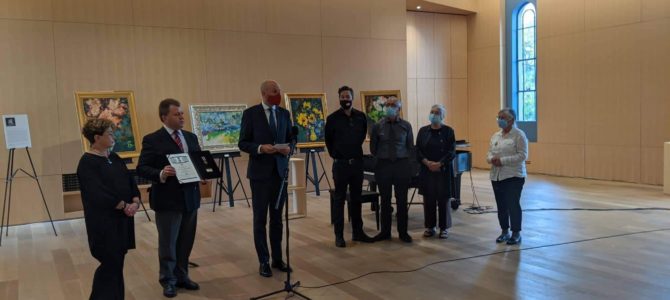
LJC Chairwoman Visits Toronto
Lithuanian Jewish Community chairwoman Faina Kukliansky attended an event by the Lithuanian embassy to Canada and the Canadian-Lithuanian community held Saturday at the Anapilis Hall set up by Canadian-Lithuanians generations ago in Toronto.
Kukliansky welcomed attendees at the event which was intended to issue Lithuanian state awards and letters of thanks from the ambassador to members of the Toronto Lithuanian community for support rendered to the Lithuanian state. It included a presentation of virtual Canadian Lithuanian Museum and archive exhibits and a musical performance by Litvak opera soloist Rafailas Karpis accompanied by. D. Mažintas. After the event participants visited the St. John’s Church cemetery adjacent to the venue and laid a wreath for those who fought for Lithuanian independence. Attendees also visit the Canadian Lithuanian Museum there.
Faina Kukliansky visited the Holy Blossom Temple in Toronto Sunday, which included “A Letter from the Past: Yiddish Songs” performed by Karpis and Mažintas. Lithuanian ambassador to Canada Skusevičius and Kukliansky presented the 300th anniversary coin commemorating the Vilna Gaon issued by the bank of Lithuania to synagogue leaders and the Lithuania Order of the Life-Saver’s Cross to the family members of Righteous Gentile V. Baltušis
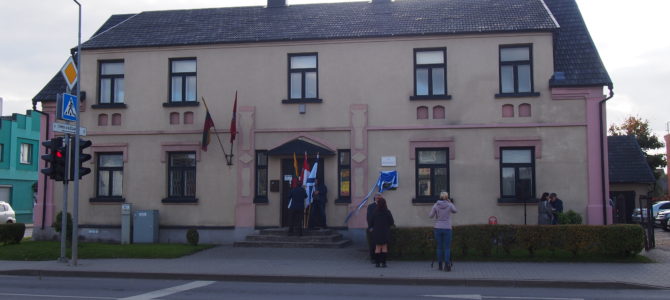
Plaque Commemorating Jewish School Unveiled in Tauragė
by Margarita Rimkutė, taurageszinios.lt
Perhaps not every resident of Tauragė knows that the building which houses the Tauragė district prosecutor’s office was once a Jewish primary school. On Wednesday a ceremony was held to unveil a plaque commemorating the 100th anniversary of the Tarbut school there. The event was part of a series of events in town called “The Shtetl in Tauragė.”
Senior events director of the Cultural Center Algima Juščiuvienė led the event and said the school established in 1921 held classes until 1941.
“The horrific tragedy of the Holocaust silenced the cries of children playing and killed the Jewish spirit of this city. In 1947 a Russian pre-gymnasium was set up in the building. In 1954 it housed the Tauragė music school, in 1988 an evening school, and since 1996 the building has belonged to the prosecutor general. It is the oldest school building in the city. The Jewish school which had four grades then had 250 pupils. All the school’s teachers were licensed and drew their salaries from the Ministry of Education. The school belonged to the Tarbut school network, meaning it was the strongest modern educational organization in Eastern Europe,” Algima Juščiuvienė said.
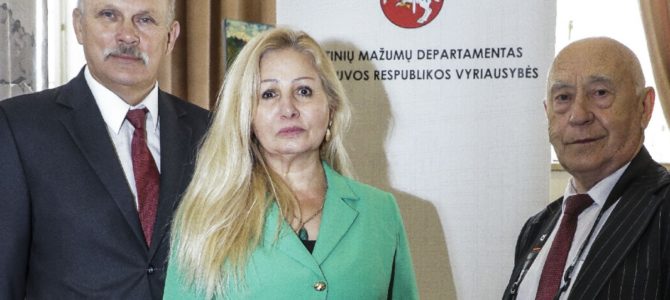
Lithuania’s Department of Ethnic Minorities Presents Annual Award to LCJ Chairwoman
Congratulations to Lithuanian Jewish Community chairwoman Faina Kukliansky on receiving a gold medal prize from Lithuania’s Department of Ethnic Minorities at a ceremony held at the Vilnius Old Town Hall on Monday, September 27. She received the prize in recognition of her work in the year 2020.
Many others received similar prizes, including the mayor of the regional administration of Jurbarkas and the Zundelovičius family for the memorial to the Synagogues’ Square in Jurbarkas erected in 2019. The regional administration of the Telšiai district and its mayor were also recognized for the conservation of the Telz yeshiva building and its adaptation for public use in 2020.
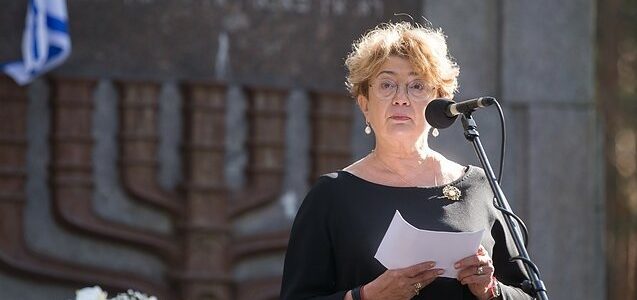
LCJ Chairwoman Faina Kukliansky’s Speech at Ponar
Honored guests,
I stand before you in order to deliver a speech, but this place and this sad occasion calls for concentrating and remaining silent. The reflection, respect and humble silence which meets every thinking and feeling person in this place cannot be confused with the silence of apathy, ignorance and fear. All of us have kept silent too long. Too long. We have kept quiet about what happened, where it happened and why. It was kept quiet for most of those eight decades we count since the beginning of the Holocaust in Lithuania. Out of fear? Ignorance? Apathy?
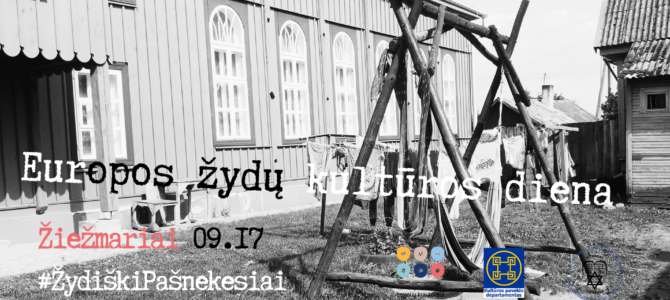
Synagogue in Žiežmariai Opens Doors
The Lithuanian Jewish Community and the Kaišiadorys city municipality invite the public to visit the restored synagogue in Žiežmariai, Lithuania, September 17.
As part of the European Days of Jewish Culture, the LJC is sponsoring the event in Žiežmariai to discuss the public utilization of Litvak heritage sites and the relationship between the local community and this synagogue specifically.
The event will be moderated by Martynas Užpelkis, the LJC’s heritage specialist.
Participants will include LJC chairwoman Faina, Kukliansky, Kaišiadorys mayor Vytenis Tomkus, Lithuanian heritage expert and historian Diana Varnaitė, Kaišiadorys Museum director Olijardas Lukoševičius and others.
The event begins at the synagogue at 2:00 P.M. on September 17.
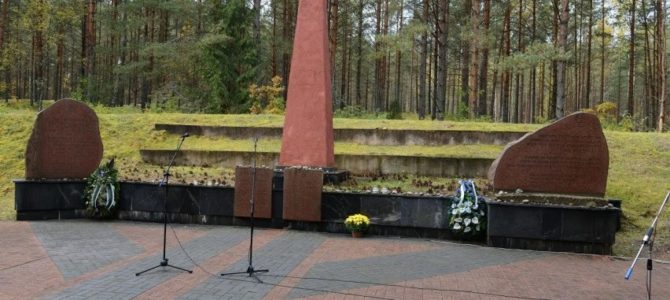
Invitation to Remember and Honor the Large Jewish Community of Švenčionys Murdered in the Holocaust
It has become a tradition now to meet on the first Sunday in October at the Menorah in the park in Švenčionys to remember and honor the large Jewish community of Švenčionys who had their own culture and traditions, and to remember their tragic fate.
I am please to invite everyone to attend the Holocaust commemoration at the Menorah statue in the Švenčionys city park marking the boundary of the Švenčionys ghetto. The commemoration starts at 11:00 A.M. on October 3, 2021.
Program:
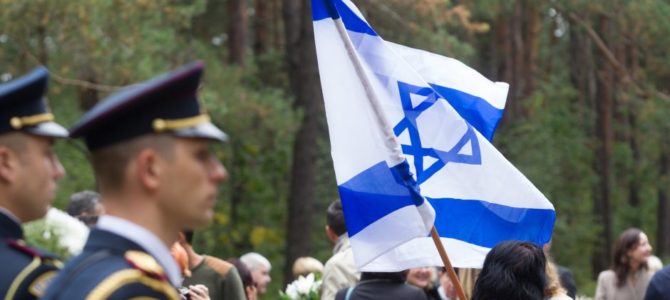
Alytus Marks 80th Anniversary of Onset of Holocaust
Wednesday the city of Alytus south of Vilnius marked the 80th anniversary of the beginning of the Holocaust with a procession before noon from the Old Town to a mass murder site in the Vidzgirdas Forest.
A commemoration ceremony was held at the memorial at the Holocaust site.
Jewish community members from Kaunas and Vilnius, Lithuanian foreign minister Gabrielius Landsbergis, MPs, local government officials, foreign ambassadors, students from schools in the area and local residents participated.
Following the ceremony the renovated synagogue building on Kauno street was opened as the new home of the Alytus Audio-Visual Arts Center with a concert by Rakija Klezmer Orkestar.
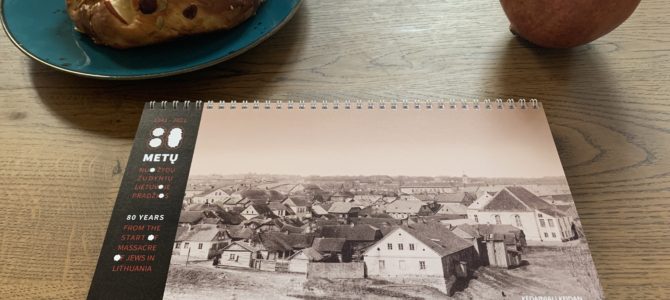
New Jewish Calendar Available
The Lithuanian Jewish Community is happy to announce our annual Jewish calendar has been printed and is ready for distribution. This year’s calendar, for the year 5782, features the communities and people who lived in Lithuania before the Holocaust, with period photography from shtetls across the country. The format this year is smaller and hopefully more convenient and functional but contains the features from past years, including local times for Sabbath, fasts and holidays. It will be made available to the public starting Thursday, September 9, at the Bagel Shop Café.
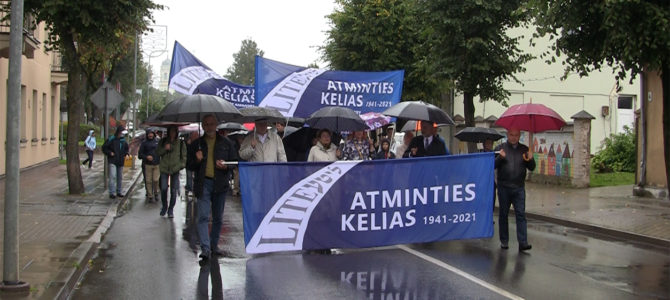
Molėtai Marks 80th Anniversary of Holocaust with Commemorative March, New Monument
The Lithuanian city of Molėtai, located about 60 miles north of the capital Vilnius, marked the 80th anniversary of the beginning of the Holocaust on August 29. On that date in 1941 more than half the population of Molėtai, the local Jewish community, was murdered.
Five years ago a large Jewish commemorative march was held in Molėtai, attracting international attention. Tzvi Kritzer, the organizer of that event, was made an honorary citizen of Molėtai by the local municipality.
This year’s event began with the unveiling of a monument at the site where the town’s four synagogues once stood. The monument is a commemorative plaque affixed to a large field stone in the town center with a silhouette of the former synagogues and inscriptions in several languages saying this is where the synagogues once stood. Saulius Pilinkus, an art historian who was directing this event, called upon Lithuanian Jewish Community chairwoman Faina Kukliansky, Molėtai regional administration mayor Saulius Jauneika, screenwriter and cartoonist Ilja Bereznickas and the creator of the plaque, Aurimas Širvys, to help in the unveiling.
Speaking at the unveiling ceremony, administration mayor Saulius Jauneika and Molėtai Regional History Museum director Viktorija Kazlienė both said Molėtai is striving to restore historical memory.
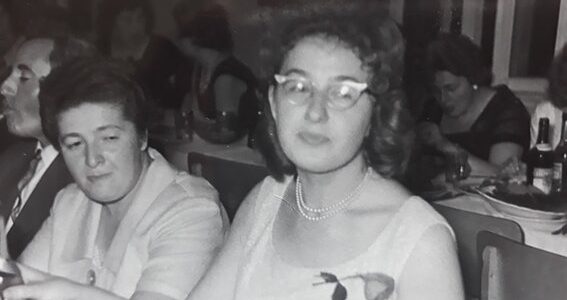
Celebrating 100 Years since the Birth of Olga Aleksandrovna Šteinberg
Photo: Olga Šteinberg with Veronika Vitaitė, from Veronika Vitaitė’s collection
The Lithuanian Academy of Music and Theater will mark the milestone 100th anniversary of the birth of pianist, professor and Lithuanian musical giant Olga Aleksandrovna Šteinberg at 6:00 P.M. on September 9 in the main hall there. The event was postponed from April 20 of last year due to health concerns. Her students will perform and share their memories and a film about her life will be shown.
Olga Šteinberg was born in Roston-on-Don on April 20, 1920. Her first teacher was her aunt Sara Kan, a concert pianist, who taught her at home. Her family moved to Odessa where she studied music at the school located inside Piotr Stoliarky’s home. Even then she performed with her future husband Shaya (Alexander) Livont. She began studies at the Odessa Conservatory in 1939 but when the war broke out she was forced to quit classes. She and her mother first fled to Udmurtia where she gained much work experience reading musical notation and working with artists at the Musical Comedy Theater in Izhevsk. Later she matriculated at the Sverdlovsk (Yekaterinburg) Conservatory in 1942 under Heinrich Niehaux. From 1943 to 1947 she studied at the Tchaikovsky Conservatory in Moscow under Yakav Zak, matriculating with a recommendation from Livont.
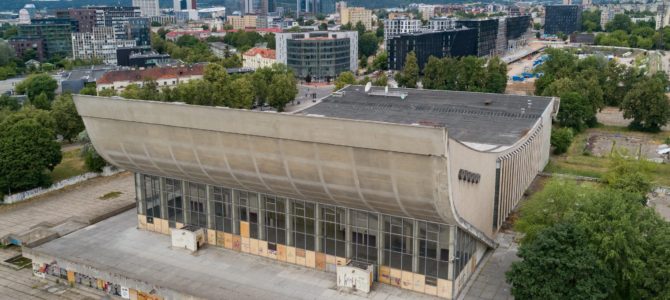
Vilnius City Council Says Palace of Sports Reconstruction Must Go On
Photo by Saulius Žiūra
In response to a Government decision not to go forward with plans to reconstruct the Palace of Sports in Vilnius, the Vilnius City Council adopted a resolution today [August 25] urging the Government and other state institutions to continue with the reconstruction project to build the Congress Center [convention center] meeting international standards and important to the nation as a whole.
Vilnius mayor Remigijus Šimašius tabled the resolution and said: “It is very important for Vilnius that the central part of the city be vital, and the renovated facility would allow for exploiting the potential of conference tourism. There is a real lack of a conference center in Vilnius. Maybe the Government has a different vision, but I would highly urge to continue the project which the capital, business and all of Lithuania need.”
The city council pointed out the capital has set for itself the goal of building a conference venue in its general plan and other strategic documents which could appear following reconstruction of this protected building with unique architecture.
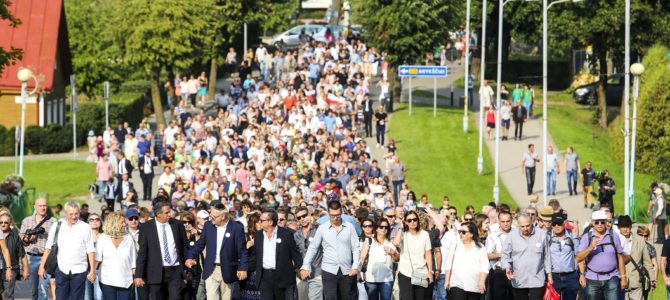
Five Years On Molėtai Marches Again
Five years ago Marius Ivaškevičius wrote of the need to remember the exterminated Jewish community of Molėtai, a town about 60 miles north of Vilnius. His call to mobilize with a march through the town became the second-most popular item ever on this website (the most popular being a reprint of an article about the South African Jewish community which continues to attract hits years later). The march itself was a watershed moment in Lithuanian Holocaust consciousness, drawing ethnic Lithuanians from around the country and the world together with Lithuanian Jews and Jews from South Africa, Uruguay, Great Britain, the USA and other countries. Several thousand people turned up on the town square and listened to the different speeches before marching to the mass murder site across town there.
The march was covered by the New York Times, Washington Post, Frankfurter Allgemeine, Jerusalem Post and other publications.
The march is to be repeated this year. August 29 is the date all Jews from Molėtai were murdered. On that “Day of Wrath” they were marched under armed guard two kilometers from one of the synagogues to the killing ground.
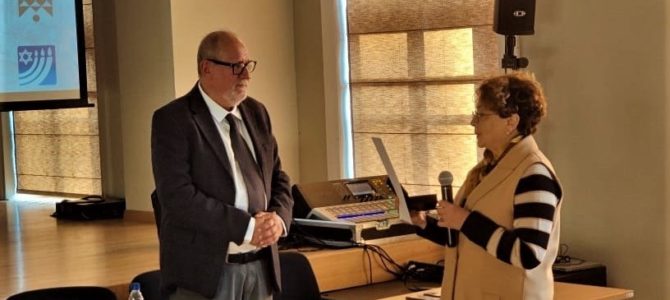
A Lecture and a Prize
Jon Seligman of the Israeli Antiquities Authority delivered a lecture called “The Great Synagogue of Vilnius: Finds from the Past and a Vision of the Future” in the evening on August 24 in the Jascha Heifetz hall on the third floor of the Lithuanian Jewish Community in Vilnius.
Lithuanian Jewish Community chairwoman Faina Kukliansky made use of the occasion to present the Year of the Vilna Gaon and Litvak History commemorative medallion to Jon Seligman for his work keeping Litvak traditions, learning and the Litvak cultural legacy alive.
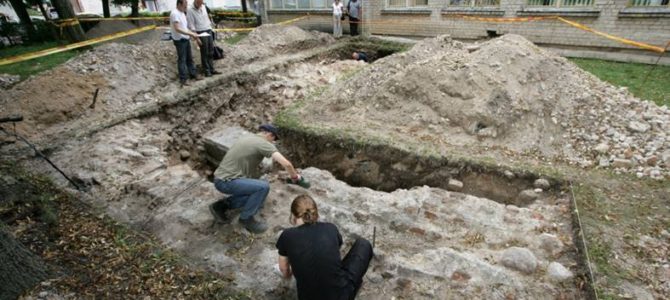
News from the Great Synagogue
Archaeologists continuing their annual summer digs at the Great Synagogue complex in Vilnius plan to share their results from this year’s dig with media at the site itself at noon on August 26. The site is located at Vokiečių street no. 13A in Vilnius.
This year they continued to uncover the bima and aron kodesh, and uncovered a floor mosaic. They’ve also uncovered the base of one of four pillars.
Lithuanian Jewish Community chairwoman Faina Kukliansky said “This year there was an especially moving moment: finally we have seen the central part of the synagogue which was destroyed more than sixty years ago.”
Media contacts:
Michail Segal, executive director, Lithuanian Jewish Community, +37065075939, info@lzb.lt
Dr. Jon Seligman, Israeli Antiquities Authority, jon@israntique.org.il
Zenonas Baubonis, archaeologist, z.baubonis@gmail.com
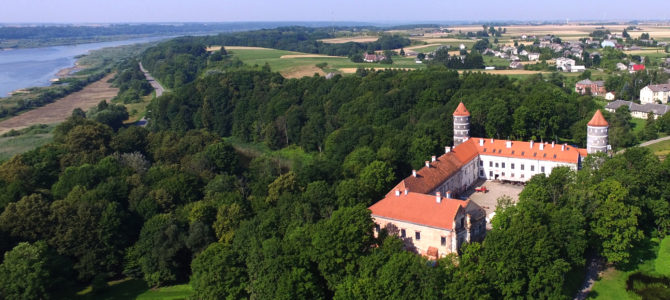
Gesher Club Offers Tour
The Gesher Club at the Lithuanian Jewish Community is offering a two-day tour of the Panemunė castles and the Curonian Spit on August 28 and 29. The group will visit the Pažaislis monastery, the Raudondvaris manor estate, Vilkija, the Veliuona earth-mounds and the Raudonė and Panemunė castles. They will also visit the Holocaust memorial and Alley of Synagogues in Jurbarkas, with rest and an overnight stay in Klaipėda with an evening tour of the Klaipėda Old Town. Following breakfast on Sunday the group will move on to the Curonian Spit with visits to Juodkrantė, the Dead Dunes and Nida, followed by the return trip to Vilnius. The tour will be conducted by long-time LJC member and professional tour guide Markas Psonikas. For more information and to register, call+37067881514 or send an mail to zanas@sc.lzb.lt. For more about Markas’s tours, see here.

